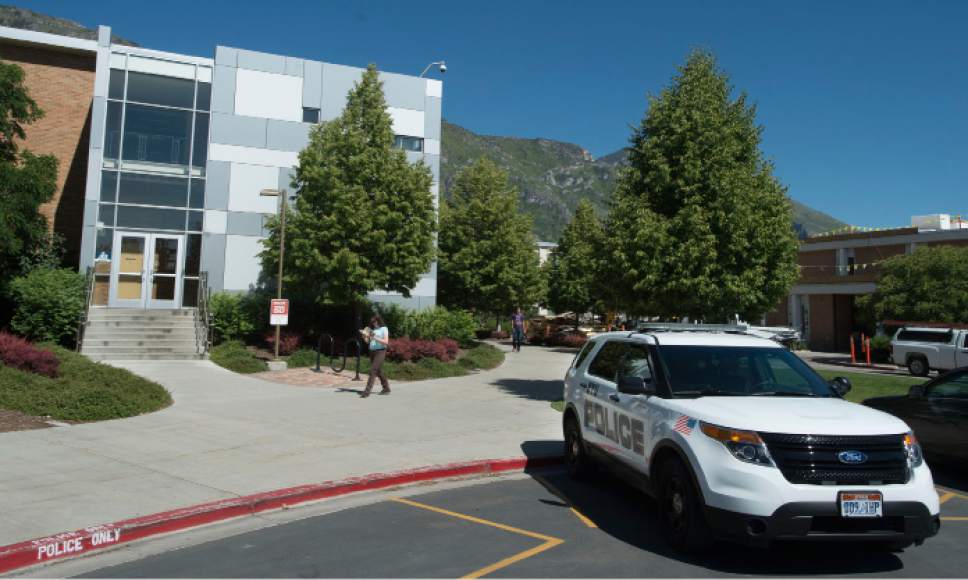This is an archived article that was published on sltrib.com in 2016, and information in the article may be outdated. It is provided only for personal research purposes and may not be reprinted.
How a Utah judge defines a single word — "established" — could be crucial to her decision whether to dismiss a lawsuit filed by The Salt Lake Tribune challenging the assertion that Brigham Young University police are exempt from open-records requests.
The law enforcement arm of the private university, owned by The Church of Jesus Christ of Latter-day Saints, contends it doesn't have to comply with state records laws, and the State Records Committee has agreed. The Tribune appealed that decision in 3rd District Court.
Attorneys for the state and BYU have asked 3rd District Judge Laura Scott to dismiss the case, and, on Monday, lawyers argued in her courtroom. Their arguments centered around one section of the Government Records Access and Management Act (GRAMA), which defines a public governmental entity as one that is "funded or established by a governmental entity to carry out the public's business."
But who established the BYU Police Department — the university that created it or the state of Utah in giving it full police powers?
State statutes define many words, but attorneys said the word "established" isn't one of them. They offered about a half dozen dictionary definitions to the judge, who took the matter under advisement and is expected to make a written ruling.
Paul Tonks, an attorney with the Utah attorney general's office who represents the records committee, said state law is clear that BYU's police department is not a governmental entity, and it is the school that established the police force. Though the state certified the school's police department and its officers, Tonks said, that is different than "establishing" the force.
He said the records committee believed the law was "so clear" that members did not have to hold a hearing to decide that they didn't have jurisdiction to hear an appeal filed by Tribune reporter Matthew Piper, who had asked for emails sent between BYU police and the school's Honor Code Office.
Tribune attorney Michael O'Brien argued in response that BYU officers would not have their policing powers — the same powers to arrest, use deadly force or other privileges that any other Utah police officer has — if not for the state granting them.
"BYU may pay the bills," O'Brien argued, "but that's all they can do unless the state is involved."
O'Brien said state law doesn't exclude the possibility that two entities established the police department, and argued the judge could find that both BYU and the state established the police force.
But BYU attorney Jim Jardine argued he didn't believe state law allowed for multiple establishers, saying that BYU created the force. "Words matter," he said. "To try to blur their meaning is to really disregard legislative intent."
Tonks pointed to a ruling last week in which the Indiana Supreme Court ruled that privately owned Notre Dame University is not subject to open-records requests.
"We have seen throughout the country that other states are wrestling with this same issue," he said.
In the Notre Dame case, the high court ruled that Indiana law defines a law enforcement agency as an agency or department "of any level of government" that apprehends, arrests or prosecutes criminal offenders. Because of this language, the court ruled that the private university's police force is not part of government and, therefore, not subject to public record laws.
But O'Brien said The Tribune's case is more similar to an Ohio Supreme Court decision, where the high court there ruled that privately owned Otterbein University must comply with open-records laws. The high court narrowly ruled the state's statute, which defined a public office as any "entity established by the laws of this state for the exercise of any function of government," applied to the private police force because one "function of government" is enforcing criminal laws.
In The Tribune's case, Piper requested records of communication between BYU police and the school's Honor Code Office in June, amid allegations that BYU was disciplining students who report sex crimes if they were violating the school's Honor Code at the time of the assault. The code bans alcohol, coffee and premarital sex, and it regulates students' appearance and interactions with the opposite sex.
BYU police have provided numerous records in response to requests by The Tribune. However, the department replied there were no "law enforcement/public safety-related" emails between campus police and the Honor Code and Title IX employees specified by Piper. A lieutenant said that the department chooses when to voluntarily abide by public-records laws in the interest of openness, but added that an appeal of its decisions would fail because GRAMA does not apply to its private police department.
In October, BYU announced sweeping changes in how it responds to students who report sexual assault, saying it will restructure its Title IX Office and grant amnesty to victims who disclose Honor Code violations. Title IX offices investigate sexual misconduct on college campuses, under federal law.
Twitter: @jm_miller



